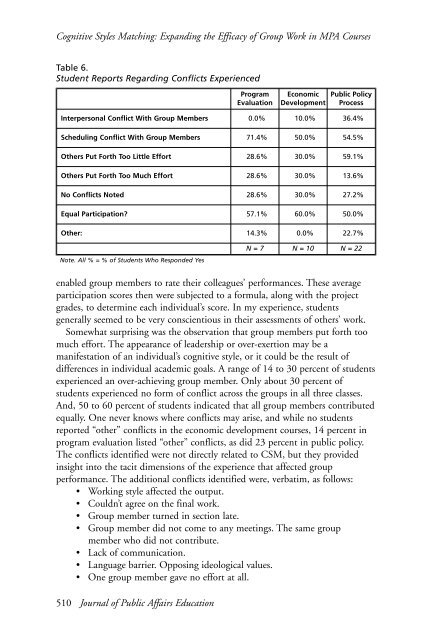JOURNAL OF PUBLIC AFFAIRS EDUCATION - National ...
JOURNAL OF PUBLIC AFFAIRS EDUCATION - National ...
JOURNAL OF PUBLIC AFFAIRS EDUCATION - National ...
You also want an ePaper? Increase the reach of your titles
YUMPU automatically turns print PDFs into web optimized ePapers that Google loves.
Cognitive Styles Matching: Expanding the Efficacy of Group Work in MPA Courses<br />
Table 6.<br />
Student Reports Regarding Conflicts Experienced<br />
enabled group members to rate their colleagues’ performances. These average<br />
participation scores then were subjected to a formula, along with the project<br />
grades, to determine each individual’s score. In my experience, students<br />
generally seemed to be very conscientious in their assessments of others’ work.<br />
Somewhat surprising was the observation that group members put forth too<br />
much effort. The appearance of leadership or over-exertion may be a<br />
manifestation of an individual’s cognitive style, or it could be the result of<br />
differences in individual academic goals. A range of 14 to 30 percent of students<br />
experienced an over-achieving group member. Only about 30 percent of<br />
students experienced no form of conflict across the groups in all three classes.<br />
And, 50 to 60 percent of students indicated that all group members contributed<br />
equally. One never knows where conflicts may arise, and while no students<br />
reported “other” conflicts in the economic development courses, 14 percent in<br />
program evaluation listed “other” conflicts, as did 23 percent in public policy.<br />
The conflicts identified were not directly related to CSM, but they provided<br />
insight into the tacit dimensions of the experience that affected group<br />
performance. The additional conflicts identified were, verbatim, as follows:<br />
• Working style affected the output.<br />
• Couldn’t agree on the final work.<br />
• Group member turned in section late.<br />
• Group member did not come to any meetings. The same group<br />
member who did not contribute.<br />
• Lack of communication.<br />
• Language barrier. Opposing ideological values.<br />
• One group member gave no effort at all.<br />
510 Journal of Public Affairs Education<br />
Program<br />
Evaluation<br />
Economic<br />
Development<br />
Public Policy<br />
Process<br />
Interpersonal Conflict With Group Members 0.0% 10.0% 36.4%<br />
Scheduling Conflict With Group Members 71.4% 50.0% 54.5%<br />
Others Put Forth Too Little Effort 28.6% 30.0% 59.1%<br />
Others Put Forth Too Much Effort 28.6% 30.0% 13.6%<br />
No Conflicts Noted 28.6% 30.0% 27.2%<br />
Equal Participation? 57.1% 60.0% 50.0%<br />
Other: 14.3% 0.0% 22.7%<br />
Note. All % = % of Students Who Responded Yes<br />
N = 7 N = 10 N = 22

















